So You Want To Compete With Steam: Epic, Discord, Kartridge, and RobotCache
Four new competitors have emerged to take on Steam: Epic, Discord, Kartridge, and RobotCache. Let's see how they stack up.
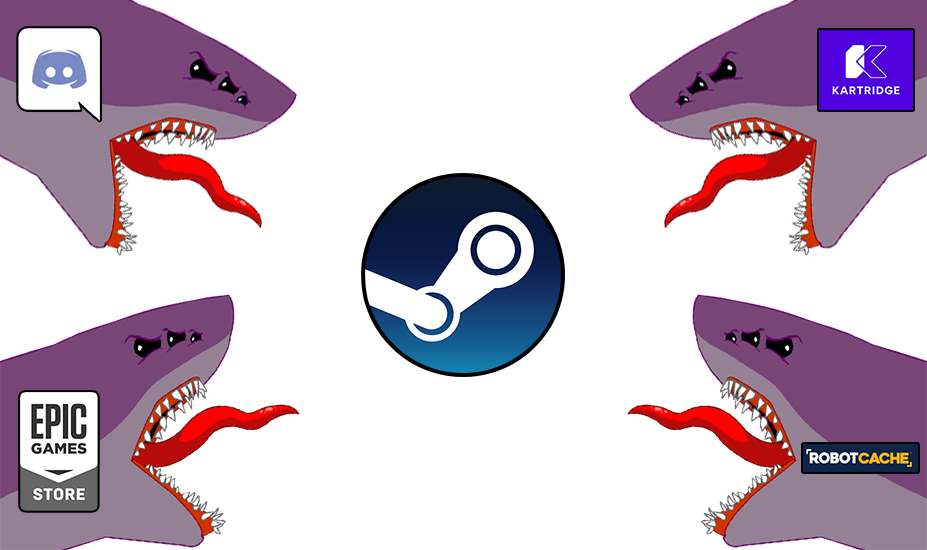
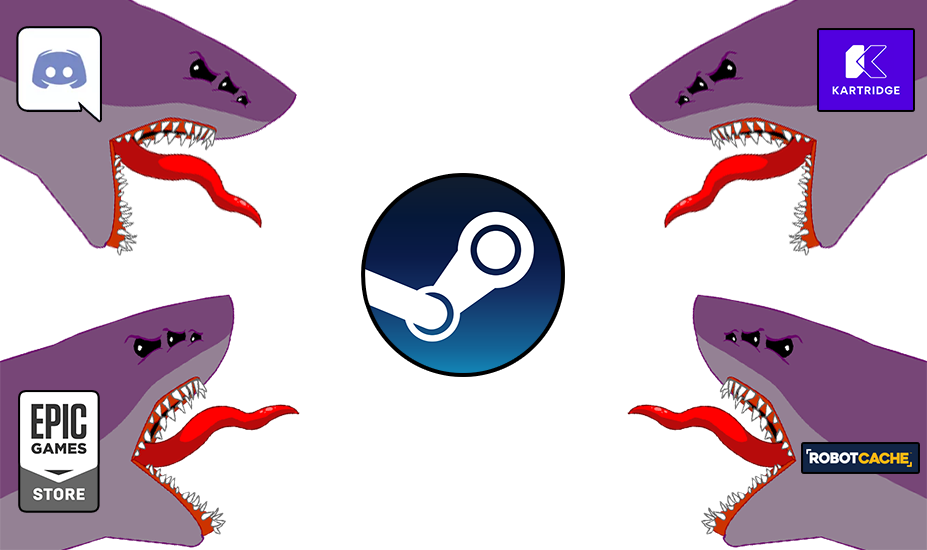
Almost exactly one year ago I wrote an article about how crazy it is to try to compete with Steam (So You Want To Compete With Steam). If you haven't read that yet, give it a quick skim.
Competing head-on with an entrenched market leader is called Red Ocean strategy, because it's like a feeding frenzy of sharks all tearing each other apart to get at the same piece meat.
Now, I'm not saying nobody should compete against Steam. What I am saying is that taking on the top shark is fraught with peril, and nearly every company that's tried so far has repeated the same fatal mistakes. Steam has reigned supreme for over 15 years for a reason, but recent rumblings suggest things are about to change:
-
My third annual developer survey suggests that developer support for Valve's 30% share just hit an all time low; this sentiment is consistent regardless of developer size, wealth, and geographic location.
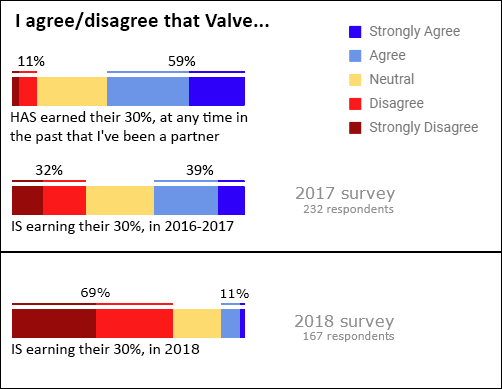
-
A few high profile bugs and glitches have undermined many developers' confidence in Steam's discovery algorithms -- "not being screwed by the algorithm" was listed as the number one concern in my survey.
-
Valve changed their revenue share, but only for games earning $10M+.
-
AAA publishers including Activision, Ubisoft, and Bethesda have followed in the footsteps of EA's Origin and Blizzard's Battle.net* in withholding their content from Steam in favor of platforms where they have more control.
*Yes I know Activision and Blizzard are part of the same company. My point is Blizzard games have always been exclusive to Battle.net, but now we're starting to see Activision titles there as well.
- There are no less than four new challengers, three of which have already launched preliminary versions of their stores.
The new challengers are:
- Discord Game Store
- Kongregate Kartridge
- RobotCache
- Epic Games Store
Some quick personal disclosures:
- Level Up Labs' co-founder Anthony Pecorella works at Kongregate full-time while I run things at LUL day-to-day. I'm not affiliated with/employed by Kongregate, nor do they own any stake in our company.
- I have friends and contacts that work at Epic, Kartridge, Itch.io, GOG, and Steam, including multiple CEO's and founders.
- I interviewed with Valve once but didn't land a full-time position.
- I've contracted on and off for Valve for small projects like e.g. Steam Input documentation but I'm not employed by them in any capacity right now.
- I'm first and foremost a game developer, so it's in my direct financial interest to egg all these companies on to compete for developer affections.
Each of these obviously biases me. Rather than feigning neutrality or doubling down on my own opinion, I'm trying to make my biases as transparent as possible here, and in my analysis below I'll do my best to consider things from perspectives other than my own.
With that out of the way, let's take these four stores through their paces and see if they've learned from those who have tried and failed before.
Object of the Game
In American Football, you don't win by gaining yards, you win by scoring points, even if yards are how you get there. In the games business, victory points are measured in terms of sales and customers.
Here's a list of fun things that shouldn't be confused with victory points:
- Winning PR slapfights on social media
- Getting lots of positive press
- Registering fifty bajillion non-paying user accounts
- Spending lots of money
These accomplishments can all be part of a balanced winning-the-game breakfast, but don't brag about your yards until you've made the touchdowns, is all I'm saying.
Okay, so you need to sell some games. That means you need developers and publishers to sign up so you can have something to sell, and then you need customers to show up and buy those games. Trouble is, these groups don't want the same things.
As I said in Stores vs. Developers vs. Customers vs. Publishers, it's far too easy for "analysts" like me to elevate one stakeholder's viewpoint above all others. In my social media bubble, the default point of view is that of developers, particularly indies. There's nothing wrong with this particular perspective, but you're here because you want to compete with Steam, and that means balancing all parties' interests while still looking out for your own. The blinders have to come off.
Therefore, one criterion for judging each of the new "Steam Competitors" is how well they appeal to each stakeholder group, not just to me as an individual.
Meet the contestants
Epic Games
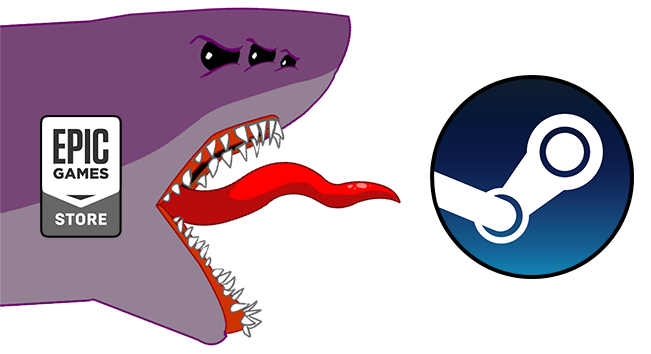
The Epic Games Store is backed by Epic Games, developer of not only the mega-hit Fortnite, but also a long string of hits stretching back decades, from the more recent Gears of War and Unreal series, all the way back to Jazz Jackrabbit and ZZT from the dawn of PC gaming.
These are the same folks who make the Unreal Engine, a general purpose cross-platform game engine positioned as a high-octane rival to Unity3D.
Epic announced their store on December 4, 2018, offering an 88/12 revenue share split across the board, regardless of earnings. Furthermore, Epic is waiving the normal 5% revenue share for Unreal Engine games sold through the Epic store.
They're also giving away a free game every two weeks on the service, and have secured exclusivity for many high-profile titles. Oh, and they own the 200-million strong Fortnite audience, which translates to some unknown number of registered Epic Games user accounts and client installs (but it's safe to say it's in the millions at absolute minimum).
Epic is the clear heavyweight in this fight with multiple built in advantages and truckloads of money. They are not to be underestimated.
Discord
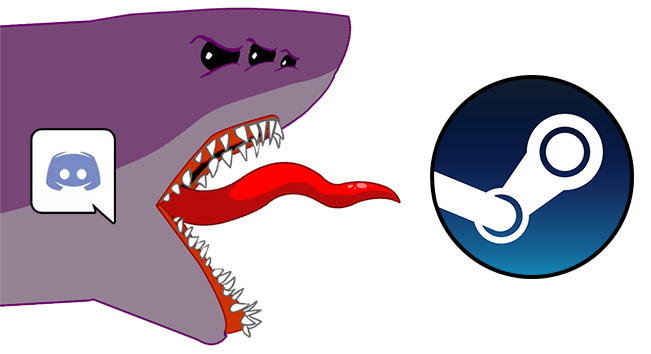
After years of rumors, Discord announced a closed beta for their own game store on August 9, 2018, which launched publicly on October 16, 2018.
The new store joins Discord's extremely popular chat service, which players overwhelmingly favor over other solutions such as Skype, TeamSpeak, Ventrilo, and even Valve's own built-in Steam chat. Discord's chat service boasts 130 million registered users as of May 15, 2018.
For context, Steam itself has:
125 million registered users (January 10, 2018)- 125 million active users as of 2015 (source: a contact at Valve and this article)
- 90 million monthly active players (as of October 2018)
- 47 million daily active players (as of October 2018)
As for growth, Steam added 27 million paying users between 2016-2018 (January 10, 2018)
As near as I can tell, Discord originally offered the usual 70/30 split, but on December 14, 2018 they changed this to 90/10 in apparent reaction to Epic's 88/12 offering.
Discord's natural advantage is their large and active chat userbase that already has their client installed.
Kartridge
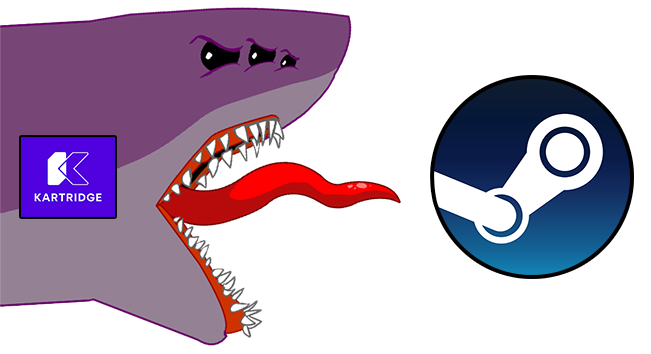
The same company behind successful web games portal Kongregate.com launched their downloadable game store in open beta on November 1, 2018.
Kartidge's focus is indie game developers -- they're offering 100% revenue share on the first $10,000 in sales, and for exclusive titles, a 90/10 split on the next $40,000. For context, these offers were announced on April 24, 2018, several months before Kartridge's open beta launch and Epic and Discord's revenue share announcements.
Kartridge was the first to take a bold stance on developer-friendly revenue share, but has now been arguably matched and even exceeded by Epic and Discord. Kartridge's full 1.0 launch still lies ahead, so it will be interesting to see how they respond to changing circumstances.
Kartridge's chief advantage comes from their hit web games portal -- not only does it have a large userbase to draw from, they have years of experience surfacing high-quality titles from user submitted games; they were already working on "discovery" six years before Steam even launched greenlight. To win over developers they'll have to show they can attract a sizable audience to their client.
RobotCache
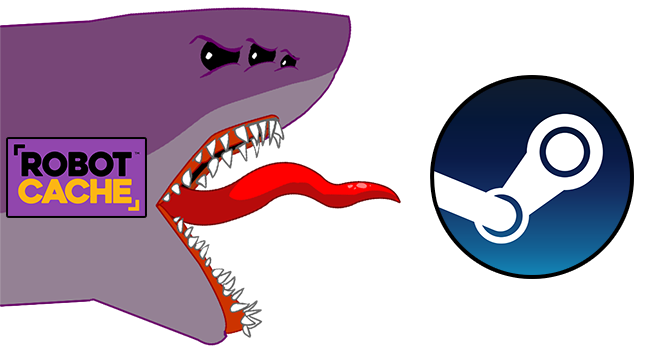
Brian Fargo, founder of Interplay and InXile, announced RobotCache on January 16, 2018 and is supposed to launch sometime in 2019. The original pitch has gone through a few drafts, all of them involving everyone's favorite tech buzzword, blockchain.
The first pitch:
- 95/5 revenue share split with developers & publishers
- Features a new cryptocurrency called "Iron" sold in an initial coin offering and mined thereafter.
- Allows for players to resell their used games, splitting the resale price 25/70/5 between players/devs/store (respectively).
- Developers & publishers set the resale price
- Game ownership records are stored on the Iron blockchain
- Players can use the client to mine Iron
The pitch has changed on a few points since then:
- Iron is no longer a cryptocurrency, now it's just a plain virtual currency
- There will no longer be an ICO
- Iron is a simple loyalty rewards system now (c.f. airline miles, Steam wallet credit)
- Customers can still "mine" Iron by running the client
- Blockchain is still involved somehow.
I reached out to RobotCache and got clarification from one Jim Redner on how they're incorporating Blockchain:
Blockchain technology is like a virtual ledger, recording all transactions. If you purchased Game A on Robot Cache, the blockchain shows that you are the rightful owner of Game A. Once your copy of Game A is sold, the sale is recorded on the blockchain and it shows the new owner. The reselling of digitally distributed entertainment is only possible due to blockchain technology.
I'm not sure I agree with that last sentence -- I don't see what a distributed trustless cryptographic ledger brings to the table when a centralized entity (RobotCache) is still going to be in charge of serving up your actual downloads and taking 5%. A plain ol' SQL database seems like it could handle this fine. Perhaps I'm missing something but my default position is skepticism.
RobotCache is the most unique pitch so far, but will be a late entry to a fiercely crowded market. Still, a 95/5 revenue split is nothing to sneeze at, provided they can nail all the other aspects of their service. And who knows, maybe this blockchain-based resale scheme will catch on.
Piracy
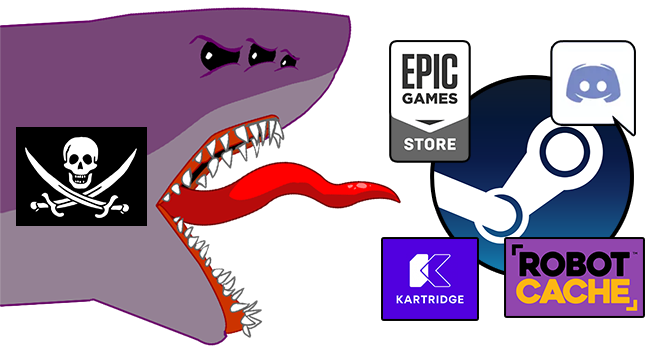
Did I say there were only four contestants? Looks like a secret fifth contestant has snuck onto the set when we weren't looking. Those of you who have read Piracy and the Four Currencies or the rest of the series know where I'm going with this -- you are always competing against piracy, and the "price" of your service is measured not just in money-dollars but also time-dollars, pain-in-the-butt-dollars, and integrity-dollars. Piracy charges zero money-dollars, but has a certain time and pain-in-the-butt cost, not to mention an integrity cost for those who are scrupulous or just afraid of getting in trouble with the law. If your service can't compete on the time and pain-in-the-butt costs, or you piss of your audience so much that they see you as the bad guy (raising your integrity cost), they'll become "customers" of Piracy instead.
As the exclusivity war between Netflix and its competitors heats up, we're starting to see a surge in video piracy after years of decline. When faced with the cost and hassle of having to maintain several different subscriptions, or not being able to access content at all due to regional licensing scuffles, more and more customers are opting to just pirate their content.
The parallels between streaming video services and the digital PC games market aren't perfect, but any competitor seeking to bank on subscriptions, paywalls, and DRM should be wary, lest they succumb not to Valve but to the Jolly Roger.
Notable absences
I know people are going to ask about some of these in the comments so let's get this out of the way now.
What about Twitch?
I was originally going to include Twitch in this list, but they've already bowed out of the race. Their store first went live in April 2017, and shut down on November 27, 2018.
Many people predicted that Twitch would take a big bite out of Steam given the power and reach of Twitch streamers / "Influencers", but the company's shuttering of their game store makes it clear that simply having a big successful business with a lot of users in an adjacent space, even one centered around games, is a world away from actually deploying a competitive video games store.
If you ask me, Twitch made the right decision.
Now, if I were another company that has amassed huge numbers of users from a video game-adjacent community service, whose principle monetization scheme is subscriptions, and is looking to get a digital games store off the ground, I'd be very interested in figuring out exactly what went down with Twitch.
What about Microsoft?
I might have to save them for another article. Here's a quick summary of my stupid opinions in the meantime:
- They could easily have locked up digital PC gaming a decade ago, but they have too much self-sabotage from warring internal factions
- They will need to hand out generous financial incentives to be competitive (70/30 split will just get them laughed at)
- When they do try again I'm pretty sure they're going to try some locked-down invasive DRM that will hamstring their efforts
- They need to just hand complete control of the Windows store over to the Xbox team already
What about GOG, Itch.io, etc?
These are definitely important stores, but I want to focus on new competitors today. I don't expect GOG and Itch.io to change their strategies too much in light of recent events, but they could always surprise me.
Besides, this monster of an article is more than 12,000 words, do you really want it be even longer?
What about Origin, UPlay, Battle.net, Bethesda?
For now I want to focus on new competitors heading into the "general digital games store market", not just direct sales channels for a publisher's own games. All that really needs to be said about the huge AAA publishers is that EA and Blizzard have been reliably getting away with selling their games exclusively on their own sites and others are starting to follow suit, which puts ongoing pressure on Steam from the top as new competitors rise up to attack from below.
And with all that out of the way, it's time for our first challenge! Let's start with an easy one.
1. Tell people you even have a store
It stands to reason that if you want people to come to your store and buy things, you should probably mention somewhere besides press releases that you even have a store, right?
Here's my test:
- Google the store's name and visit the first link
- Try to find a store that sells video games
(I'm using a VPN and a browser in incognito mode so that cookies and google personalization don't monkey with my search results).
Epic Games
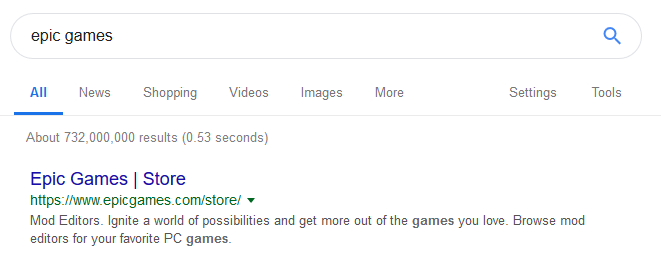
Top link is the store itself. Typing in "www.epicgames.com" redirects to "https://www.epicgames.com/store/en-US/" as the default landing page. The google blurb text is saying something irrelevant about mods, but that doesn't really matter because "Games Store" is the headline.
And here's what the store page itself looks like:
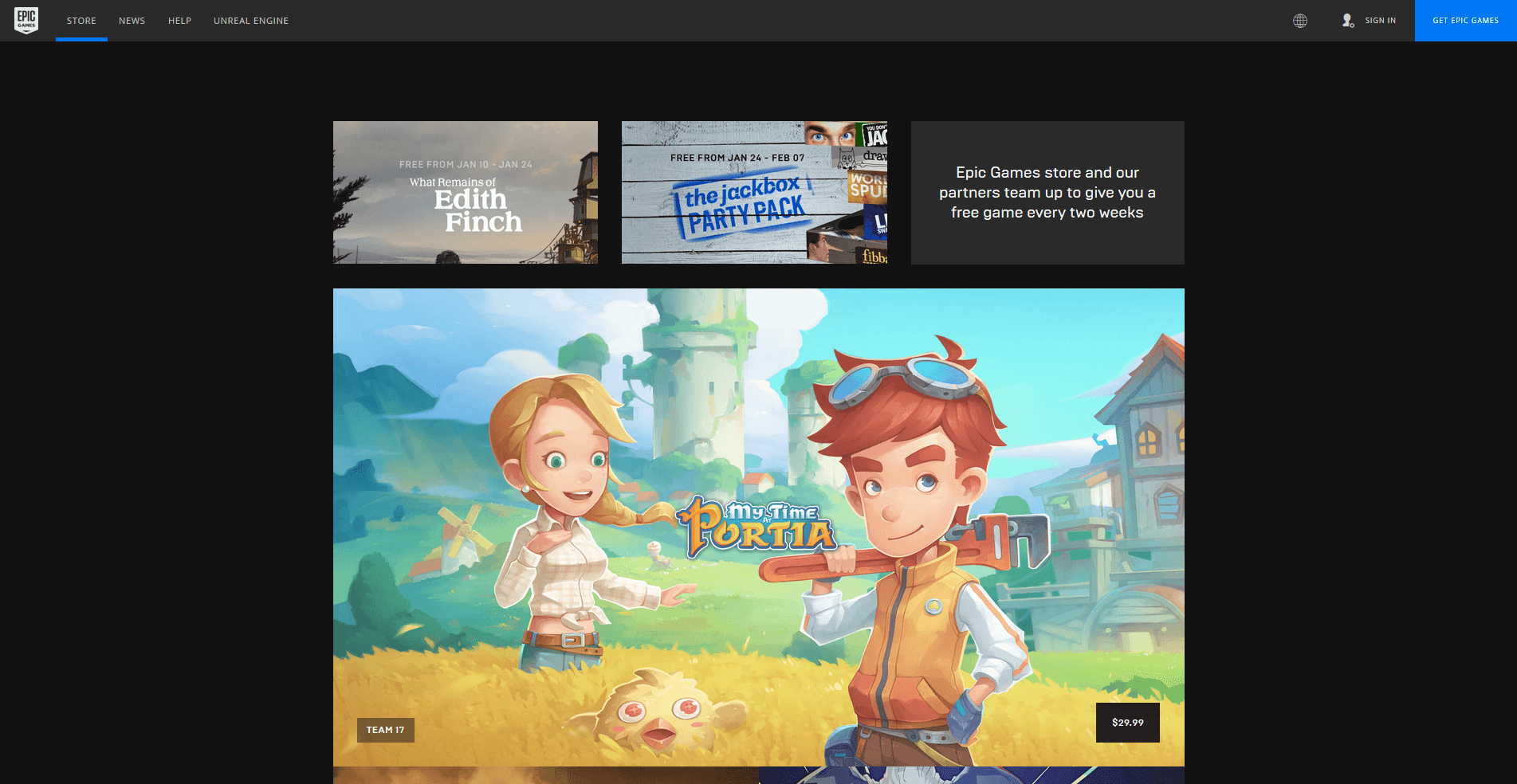
Good job, Epic. It's obvious that you have a store that sells video games. There's a clear sign in button where I expect it to be, and a link to download the client about where I expect it to be, and then a bunch of featured games I can presumably buy. Also a prominent notice that I get a free game every two weeks. I definitely missed that What Remains of Edith Finch and the jackbox Party Pack are current and upcoming free titles -- maybe hilight that a bit better since free games is supposed to be your key client download and user retention driver? It took me about six viewings of this page before I noticed that text. I did notice the free games offer on the first viewing -- though I would punch up the "FREE GAME" text to stand out better.
Good clear store design overall with only minor nitpicks, and nice to see the store prioritized to such a degree that it's the default landing page for the whole company site.
Discord
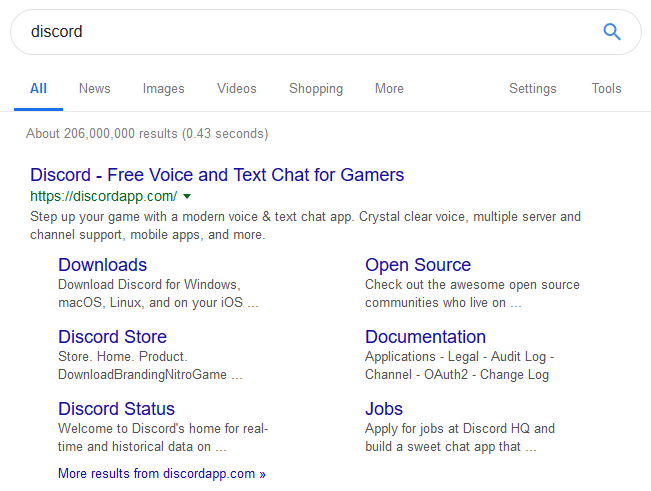
The top link is to the main Discord homepage, which is dedicated to the Discord chat service. In the google breakout boxes it shows that there's a "Discord Store," but it's not clear at all that it sells games instead of, say, hats and T-shirts. Maybe it's a store that sells "DownloadBrandingNitroGame," whatever that is.
So here I am at Discord's home page. Can you find the game store?
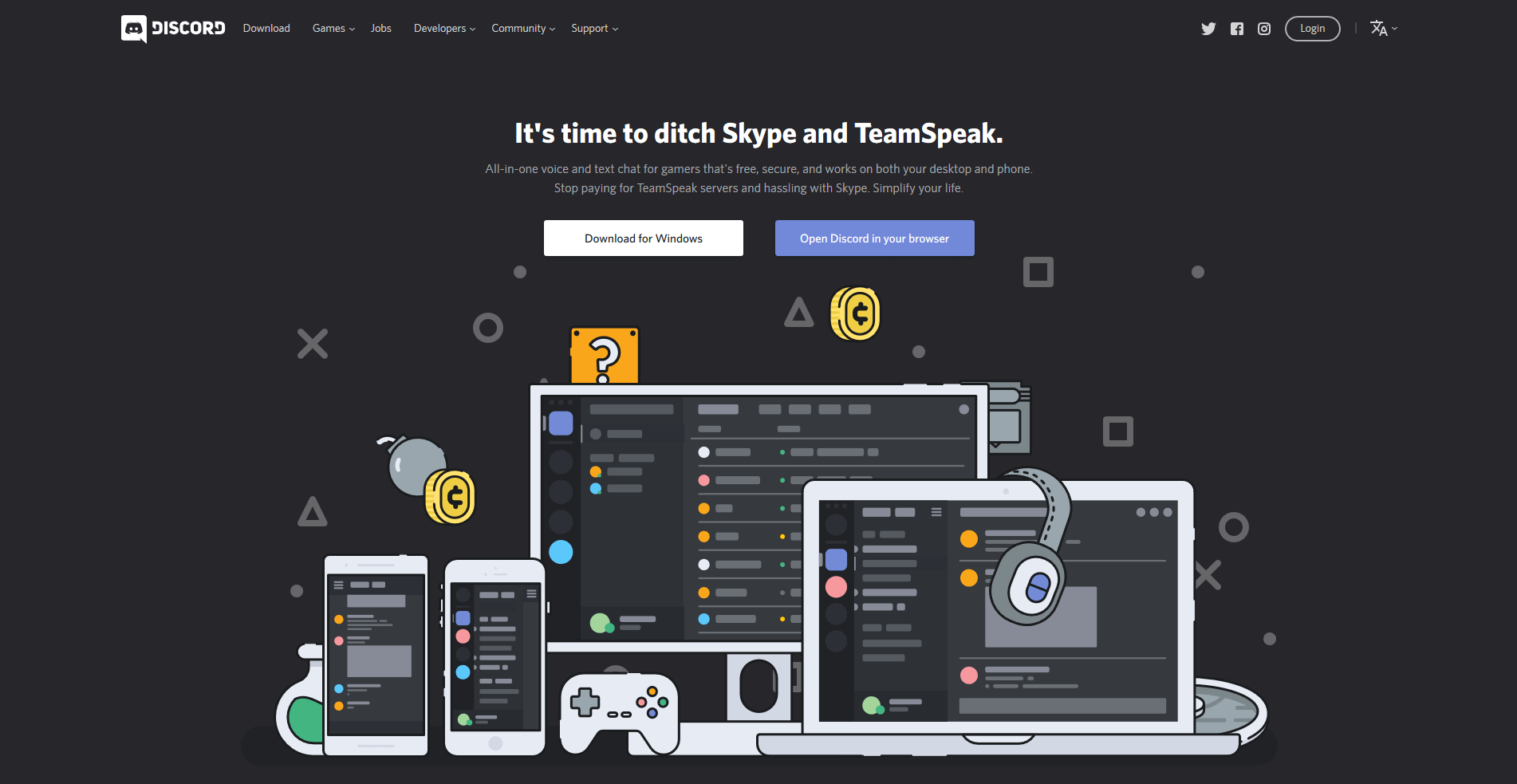
Yeah, me neither.
There's a tiny row of navigation items, some icons in the corner, a blurb with some buttons in the center, a noisy full-page graphic, and nothing that looks like a store.
There's what looks like a "Games" dropdown, but A) it's tiny and not differentiated from the other navigation elements in any way, and B) if I didn't already know there was a game store, it wouldn't be clear that this is where I should go. Discord is used to chat about games, so I would just assume it had something to do with that.
All of the central blurb text is about chat, not a game store. "It's time to ditch Skype and TeamSpeak", not a word about buying or playing games.
Alright, but let's assume I click on "Games" anyways:

First off, if I wasn't deliberately combing over this site I would have easily missed that there was even a pulldown here since it's just a tiny ambiguous "v". I'm sure graphic design minimalists think this is clean and elegant, but I'm a devout Krugist; please don't make me think!
But okay. I've got "Nitro", and "Game Directory." Even if we grant the user should know what Nitro is (Discord's premium subscription service), "Game Directory" is still ambiguous. Remember I'm posing as a user who doesn't yet know you even have a store that sells games! I know Discord is used for chatting about games, and that Discord might have info hubs about those games. But you don't want me to read about games, you want me to buy them.
Anyways, the "Game Directory" option links to "https://discordapp.com/store". Wonderful! We've now confirmed there is in fact an actual link to the game store somewhere on the home page, although it's both buried and mislabeled.
Let's summarize Discord's efforts at advertising their store on their own home page:
- The word "game store" is not on the home page
- The word "store" is not on the home page
- (Except for a link to a "merch store" below the fold)
- None of the home page text mentions a store (just chat)
- The link that contains the store is undifferentiated from the others, and all navigation links are tiny in thin, off-white font
- The link to the store is not even one of the top nav items, but buried within it as a pulldown option
- The aforementioned link does not even bill itself as a "game store" but instead a "game directory", despite linking to a page whose URL ends with the literal word "store."
Okay, but what if I search for "Discord Games" ?:
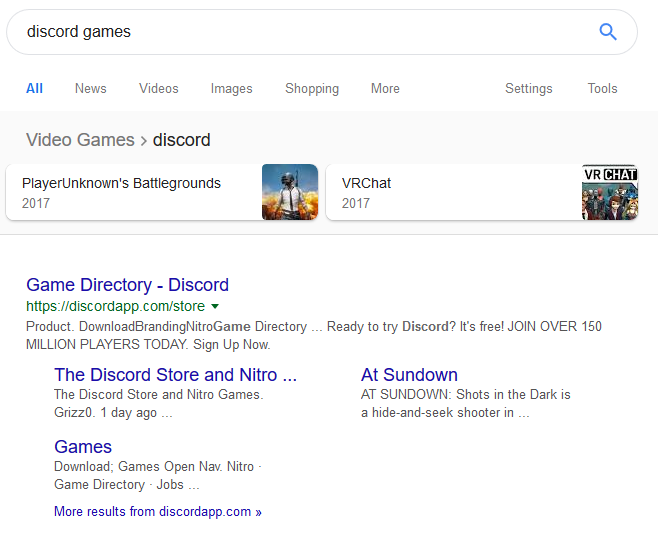
This is kind of cheating, because 1) I can't imagine typing that in unless I already know that Discord has a store, and 2) the brand is simply "Discord", not "Discord Games." I'd be pretty unlikely to do this organically.
The blurb text is a mess, and the headline says "Game Directory" rather than "Game Store," but hey, now we have a direct store link as the top result! It looks like this:
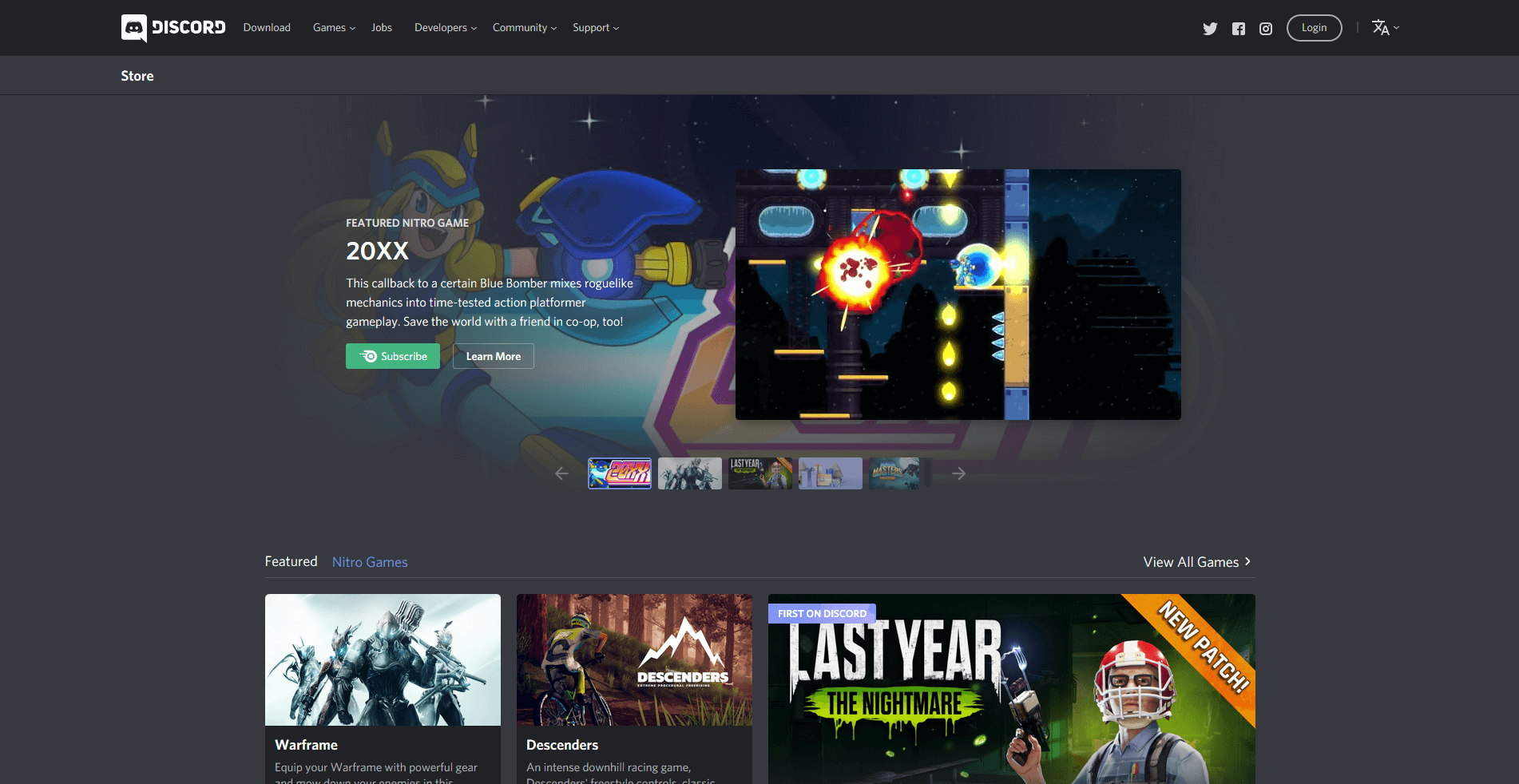
Okay! That looks like a store. Featured games, login link, this makes sense. The link to download the client is kind of tucked away, but Discord has plenty of installs already -- all they need to do is convert their existing chat users into game store customers; a process they could start any time by telling their chat users that they even have a store.
But here's the real test. Discord's secret weapon is supposed to be their super popular chat client that everyone already uses when they play games. So on that note, let's hop over to the client and see if we can find the store, shall we?
Here's a screenshot (with all my personal details blurred, and the chat window replaced with lorem ipsum):
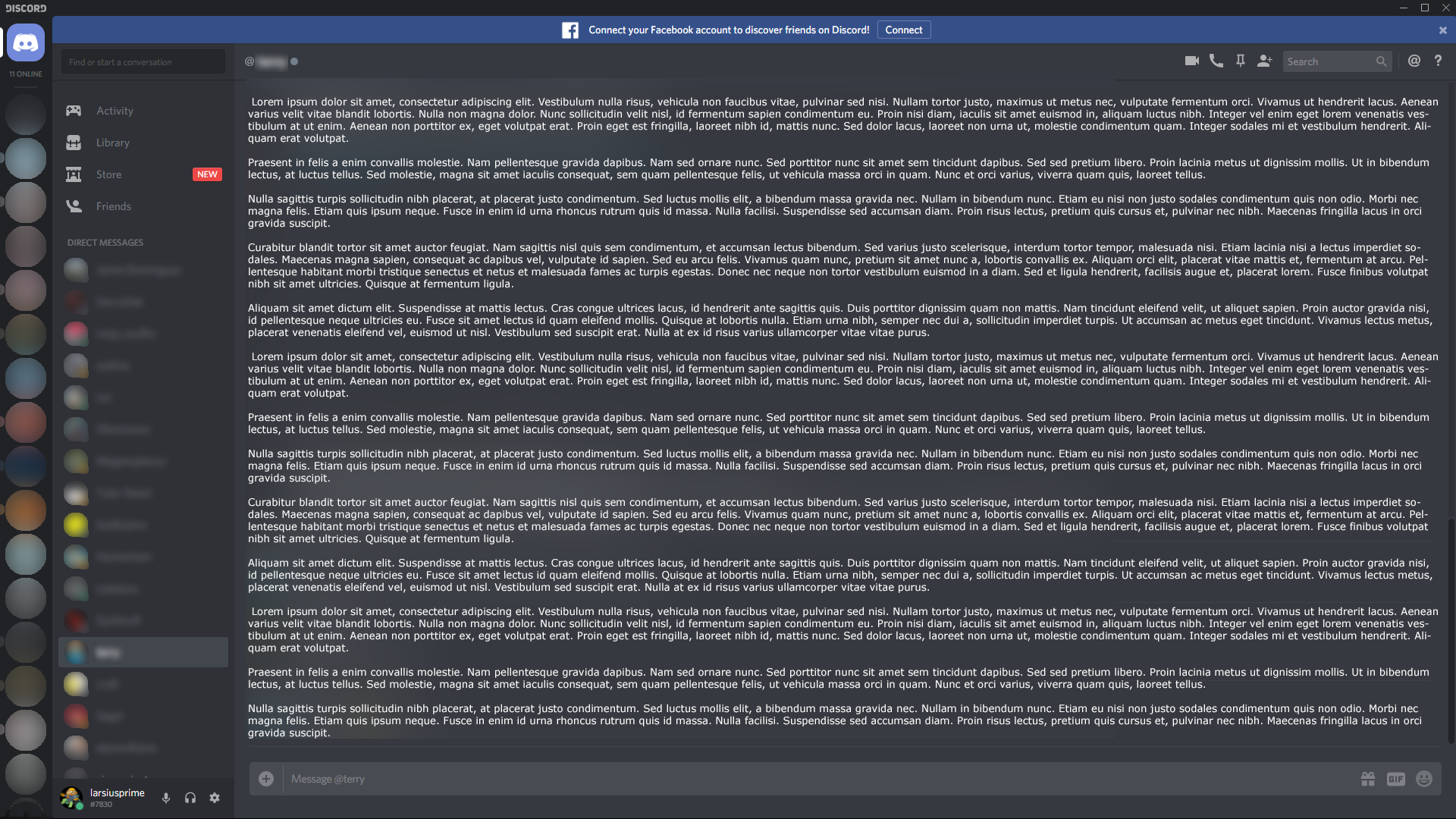
There is in fact a link here labeled "Store," but it's tiny and easy to miss. It's not labeled "Game store", so it's not clear whether we're talking about merch or games here, and the only thing drawing any particular attention to it is a little red badge that says "NEW." That's it. Also, in an unblurred screenshot, this is a lot harder to see because all the icons and text and notification badges compete more for your attention.
Tellingly, the "Connect your Facebook account" banner is more prominent than the link to the game store -- it occupies prime space at the very top and extends nearly the entire width of the screen, all in its own prominent, unique color. This is what you do when you want your users to notice and click on something.
I get it, importing Facebook contacts is important. But compared to the prominent placement this Facebook banner gets, the store itself is positively buried. (For what it's worth, the most common response I get when I ask Discord users what they think of the new store is: "Discord has a store?")
Besides the "NEW" badge (which disappears forever if you click on the store link once), nothing distinguishes "Store" from the other navigation items. I should point out that all four nav items -- "Activity", "Library", "Store", and "Friends" don't even occupy prime real estate. They're not sitting at the top or left side of anything, and are awkwardly sandwiched between the leftmost vertical column of server icons, the main content panel on the right, and the search bar / Facebook callout banner above.
It's even worse if you're currently inside a server as the navigation buttons disappear entirely to make room for a giant handy reminder about hotkeys as well as server specific channels:
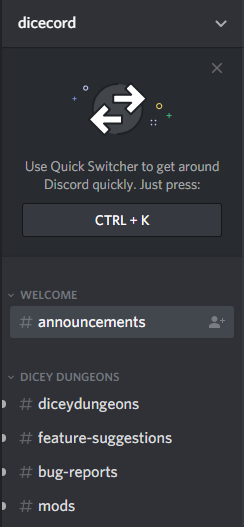
In this mode, where the average Discord user probably spends >90% of the their time, there is not a single visible or clickable link that will take you directly to the store or even let you know that it exists.
All of this paints a pretty clear picture: the Store is not Discord's first priority. It's questionable whether it's even their second. This hilights a unique problem for Discord -- they have two businesses occupying the same brand. There's an apparent struggle for screen real estate and mindshare between the chat team and the store team, and it seems the store is the B team.
Epic, by contrast, has subordinated all of their previous homepage content and put the store as the front and center focus of the "Epic Games" brand. This is what Epic's homepage looked like back in January of 2018:
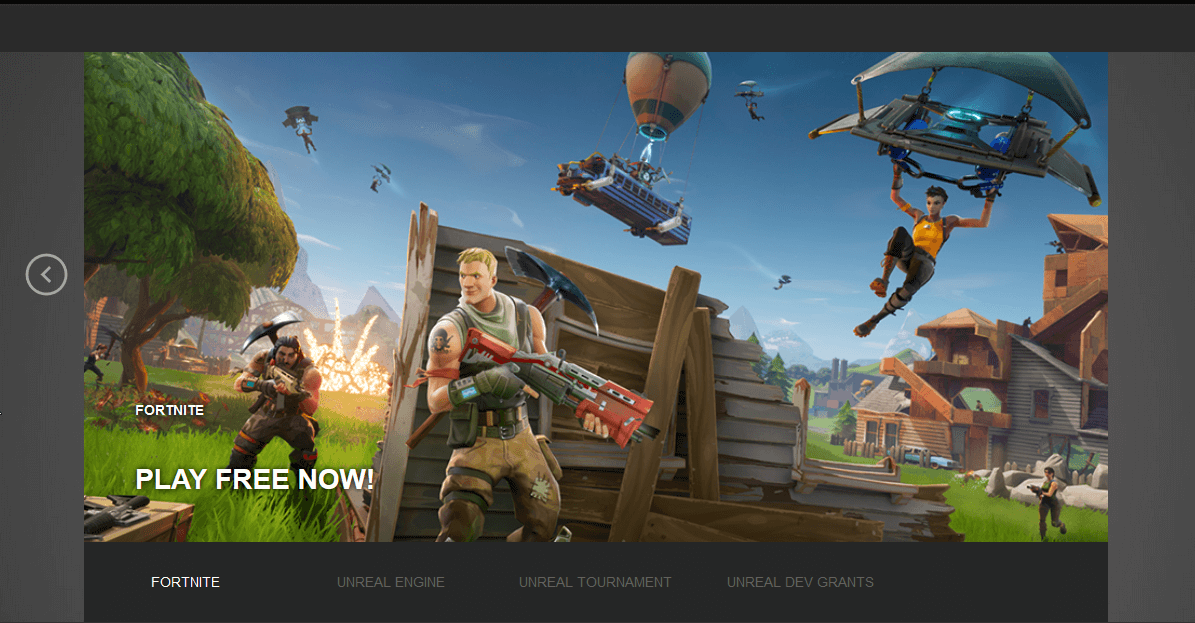
That's now been replaced entirely by the Epic Games Store. They had no qualms tucking away two mega-profitable products -- Fortnite and Unreal engine -- in order to showcase their store. To be fair, Fortnite and Unreal engine have their own separate brands and I don't imagine too many people go to epicgames.com to find them.
I understand that Discord has to thread a careful needle in promoting their new games store in a way that doesn't alienate users of their chat service, but they have failed at the basic task of informing their users that they even have a store.
Kartridge
Alright, same thing. Let's google "Kartridge":
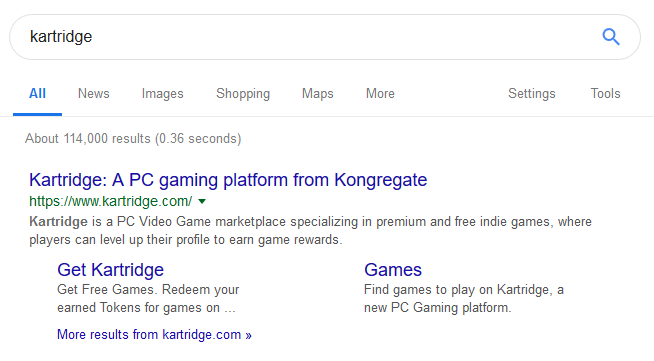
Hey look, it's a PC gaming platform/marketplace from Kongregate that presumably sells video games.
Clicking through and yup, that looks like a store:
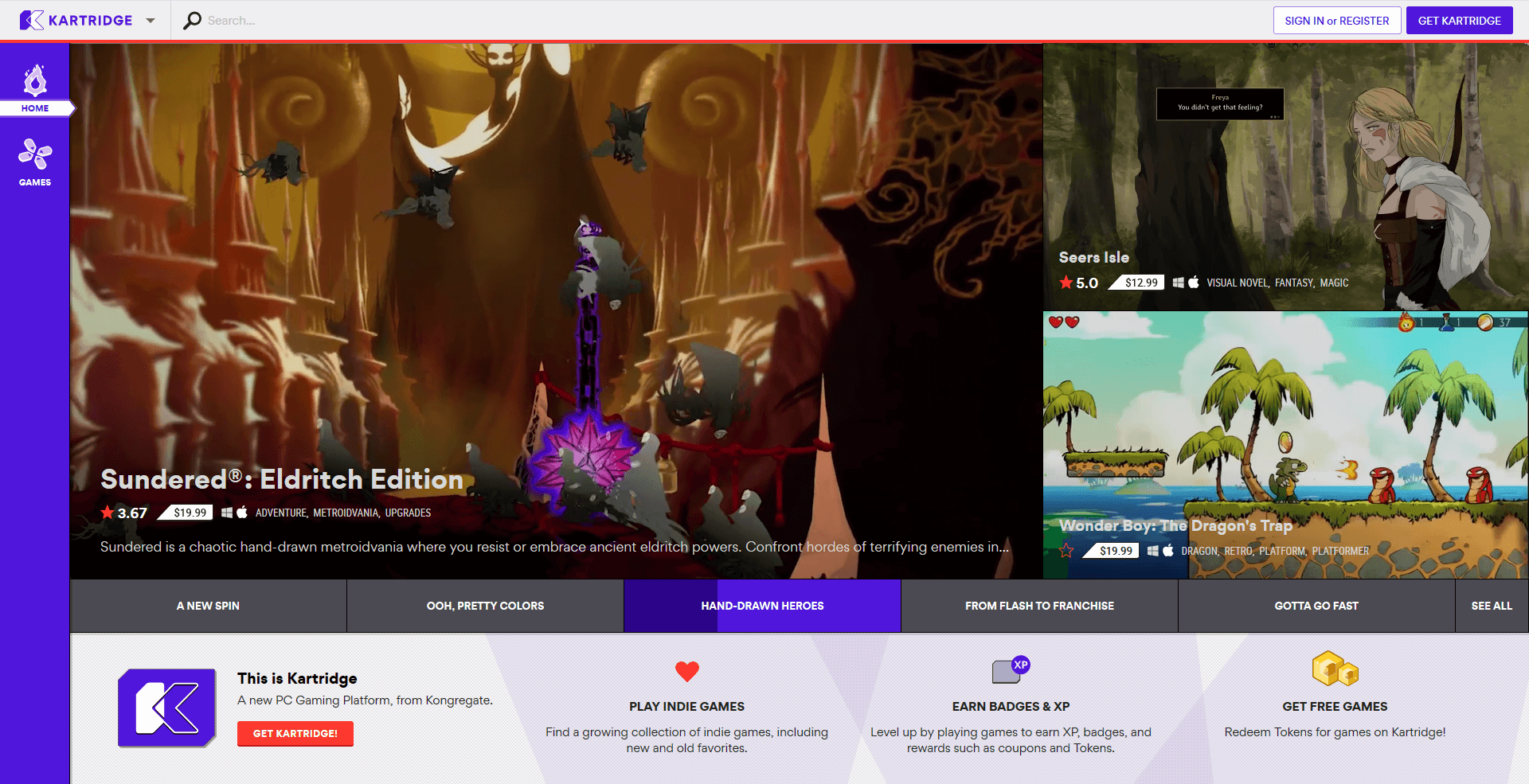
Prominent link to download the client and to sign in, and big glossy features. Cool. Not much to talk here, they did everything right on this basic task, much like Epic did.
To be fair, Kartridge has to get this right because unlike Epic and Discord, they didn't start out with millions of client installs. Discord could fix their onboarding and start converting users any time, and Epic is leaning on an install base juiced with Fortnite players, much the way Valve originally leveraged Half Life and Counterstrike players with Steam.
In contrast to Discord, Kartridge isn't attached at the hip to its mother brand, Kongregate, which remains a separate web games portal. I understand not wanting to mess with their existing business -- especially because it's been steadily making good money for over a decade. That said, one of Kongregate's natural advantages is their existing web portal audience, and if I were running Kartridge I would be looking for ways to drive Kartridge client installs. Going with two separate brands keeps things nice and clean, but it also means far fewer people have heard of "Kartridge" than "Kongregate."
Still, I would still say Kartridge has done a much better job than Discord of telling people they even have a store.
RobotCache
RobotCache still hasn't launched yet.
Three serious competitors are already staking claims and gobbling up mindshare and the old guard (Steam, GOG, and Itch) isn't going anywhere. As the field grows increasingly crowded, most industry insiders still haven't heard of RobotCache, let alone developers and customers. I genuinely wish them the best, but they need to make a huge bang when they release.
And that's the end of round one! Epic is leading the pack, Kartridge has a respectable offering, Discord is wondering whether it's rude to tell customers that they even have a store, and RobotCache is but a whisper upon the ears of nerdy industry wonks like me.
Now that we're done with warm-up questions, let's move to the real stuff.
2. Features
Let's compare the storefronts in terms of raw features. I've adapted and expanded this from a chart I found on PC Gamer, and RobotCache is not included because they haven't launched yet. This chart only includes features I've been able to confirm are available today.
| Feature | Steam | Epic | Discord | Kartridge |
|---|---|---|---|---|
| Redemption keys | Yes | Yes | Yes | Yes |
| Friends list | Yes | Yes | Yes | Yes |
| Chat | Yes | Yes | Yes | Yes |
| In-game purchases (mtx) | Yes | Yes | Yes | Yes |
| Refunds within 2 weeks | Yes | Yes | Yes | Yes |
| Windows | Yes | Yes | Yes | Yes |
| Mac | Yes | Yes | No | Yes |
| Linux | Yes | No | No | No |
| User reviews | Yes | No | Metacritic | Yes |
| User profiles | Yes | No | Yes | Yes |
| Add external games | Yes | No | Yes | No |
| Groups | Yes | No | Servers | Chatrooms |
| Cloud saves | Yes | No | Yes | No |
| Voice chat | Yes | No | Yes | No |
| Forums | Yes | No | No | Kongregate.com |
| Store search / filter | Yes | No | Yes | Yes |
| Library sorting | Yes | No | Yes | No |
| Profile vanity metagame | Yes | No | Yes | Yes |
| Client languages | 28 | 13 | 27 | 1 |
| Wish lists | Yes | No | No | Yes |
| Loyalty points / rewards | Trading cards | No | No | Tokens |
| Stats/achievements | Yes | No | No | Yes |
| Free game giveaways | Free weekends | Yes | No | Tokens |
| Coupons | Yes | No | No | Yes |
| Leaderboards | Yes | No | No | No |
| Controller configurator | Yes | No | No | No |
| Big picture / 10ft TV mode | Yes | No | No | No |
| Account sharing | Family Share | No | No | No |
| Streaming to other devices | In-home streaming | No | No | No |
| Broadcasting | Yes | No | No | No |
| Screenshot capture/sharing | Yes | No | No | No |
| User-created guides | Yes | No | No | No |
| Mod distribution | Workshop | No | No | No |
| Item trading | Marketplace | No | No | No |
| WINE/Proton | Yes | No | No | No |
| Supported currencies | 39 | 9 | ??? | Just USD |
| Referral rewards | No | Creator Tag | ??? | No |
| Pay What You Want games | No | No | No | Yes |
| Universal library launcher | No | No | Yes | No |
I was going to include GOG and Itch in this chart too, but it's already enormous so I'm keeping it to just Steam + New competitors. Suffice it to say GOG and Itch generally have more features than all the new competitors but slightly less than Steam.
I'm sure plenty of high-profile features are coming down the pipe in the coming weeks and months for each new competitor, but again I'm just going off of what's available as of right now. Please let me know if I've made a mistake and I'll update this chart, but I'm freezing it after a few days so that it represents a snapshot of this point in time.
Now, not all of these features are equally importat to everyone. I don't have data on what features customers care about most, but for developers at least I have this graph from the 2017 survey:
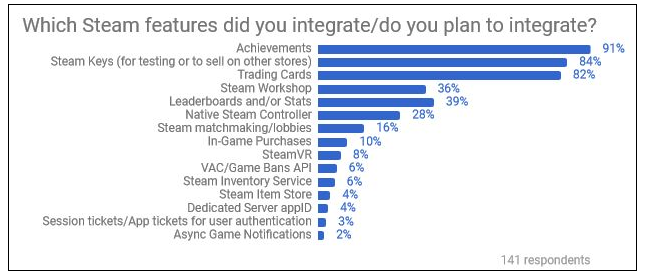
Also, depending on where you stand the existence of certain features is a straight-up negative.
It's understandable to skimp on a few features, especially when you're first starting out. No competitor can launch out of the gate with every single feature that Steam has, and priorities matter. Mindlessly copying the market leader without evaluating the cost/benefit just makes the red ocean redder because they'll always be ahead of you -- so it makes sense to find a unique strength that differentiates you from Steam and build on that.
But don't get cocky, and remember what Joel Spolsky says in Bloatware and the 80/20 myth:
A lot of software developers are seduced by the old “80/20” rule. It seems to make a lot of sense: 80% of the people use 20% of the features. So you convince yourself that you only need to implement 20% of the features, and you can still sell 80% as many copies.
Unfortunately, it’s never the same 20%. Everybody uses a different set of features.
My point is to stay sober and not underestimate just how much work has gone into the Steam client; just look at all this stuff from Steam's year-end review for 2018. Never forget that your app is a collection of tiny details.
In terms of raw bullet point features, Kartridge and Discord are the furthest along. Discord is notably ahead in number of client languages and the crucial Cloud Save feature, but Kartridge has better reward and metagame features to drive player retention and engagement, and is the sole new competitor with on-store user ratings.
RobotCache has this to say about their eventual features:
At this time, we are not able to share with you the full feature list that will be available at launch. Early Access will allow us to test out features and gain valuable feedback from our Founders.
And as for Epic, I'll let Tim Sweeney speak for himself:
The Epic Games store has the “fewer features” feature, which Steam lacks!
— Tim Sweeney (@TimSweeneyEpic) January 22, 2019
Joking aside, some people do actually prefer a streamlined client that basically just sells games, the question is how widespread that sentiment is. Still, free games may be enough to make up for an early lack of features.
One feature of Epic's that nobody else has yet is their "creator tag" referral system that allows youtubers, streamers, and other "influencers" to claim a reward for driving purchases of a game. Kartridge plans to follow suit soon, but I haven't heard from Discord. This is another feature that will probably be controversial among both developers and players, but I don't have a good read on where the majority is for either group.
Features are important, but nobody is going to win on features alone. This is good news for the contestants, because if all it took to win was features then Steam would reign supreme forever.
The bad news is that every would-be Steam competitor faces a chicken-or-the-egg problem: you need developers so you can sell games to players, but you need players lined up or developers won't bother to post games. The solution is to aggressively court both groups at once, even if that means straight up bribing them.
So for our next two challenges let's see how each competitor appeals to developers and players.
3. Developers, Developers, Developers!
Your store cannot ask for 70/30 revenue share across the board unless you can match Valve on features and audience size. And since you can't, you must straight up bribe developers to post their games on your store. Whether that's signing bonuses, grants, or minimum guarantees, cash up front goes a long way to offsetting the risks of development and getting developers to take a chance on your store.
But it's not just money developers care about, as my developer surveys suggest. Developers want high quality backends, minimal paperwork, promotions, good moderation tools for community features, and so on.
But even a really generous revenue share offer has to be backed with the promise that this service is going somewhere and will bring its own traffic. Otherwise a developer can just sell their game direct on their own site, or put a game on Itch.io which lets the developer choose any revenue share split (even 100/0).
So, how are our contestants doing in terms of luring developers to their platforms?
Epic Games
Epic has doubled down on appealing first and foremost to developers and publishers, particularly larger ones.
They've already signed a dozen exclusive titles, presumably by drowning their creators in cash. Furthermore, Epic is giving away 26 free games this year (one every two weeks), giveaways they've certainly had to pay for. And on top of all that, Epic offers 88/12 revenue share, and for anybody using the Unreal engine, waives that tool's 5% fee.
Additionally, Epic provides direct access to customers by encouraging them to subscribe to the developers' company newsletter. This is a big deal, because having a direct relationship with the customer gives developers an option to leave the Epic store and take their audience with them, whereas there's no easy way to get customer information out of Steam.
To be clear -- this is a big, huge deal. It's a tremendous sign of good will to developers.
However, the way this was first implemented was very bad. At checkout this would appear:
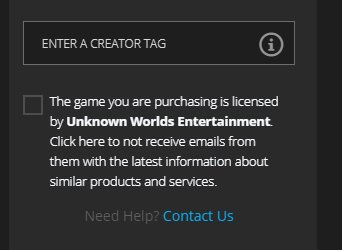
As a customer, you had to check that box to NOT give your email address; an opt-out default in violation of the GDPR which could even expose the developer to liability, not just Epic. Even though it was a "developer-friendly" move, it was sloppy and dangerous to push this feature live. The good news is it was quickly changed to opt-in shortly after launch.
Next, and somewhat controversially, Epic will not require forums or user reviews on game pages; Epic frames this as a developer-friendly move to address perceived user toxicity and review bombing. There's definitely a sizable cohort of developers who are strongly in favor of this, especially on social media. However, evidence suggests they are a vocal minority. According to my 2017 Steam developer survey only 22% of developers were in favor of Steam removing user ratings entirely, and only 14% of developers were in favor of letting developers opt-out of user reviews entirely on an individual basis (with a whopping 70% outright opposed to that scheme). Granted that was two years ago, the survey had many limitations, and I welcome a more in-depth developer survey to confirm or falsify my informal results.
But issues aside, the results speak for themselves -- Epic has no shortage of games large and small lining up to be on their platform. Plenty of developers are clearly enamored with them.
Discord
Discord is lining up timed exclusives too, which they dub "first on Discord." They don't have as many as Epic, and they're not quite as high profile, but they do have some good looking titles.
Discord hasn't matched Epic's generous "free game every two weeks" promotion and the corresponding payouts for devs. However, their subscription service, Nitro, does offer a huge selection of games. For $9.99/month or $99.99/year you get a game library of 60 games, including many notable titles like PsycoNauts, Darksiders II, Kingdom: New Lands, Wasteland 2, Super Meat Boy, and Limbo.
Discord surely had to shell out to get these deals, and so far they've done a decent job of signing titles, but it still looks like the biggest headliners are headed for Epic. Discord has Epic's revenue share beat by 2 points with their 90/10 offer, but Unreal Engine games on Epic maintain a 3-point edge.
I'd like to point out that for an emerging game store with Discord's overheads, 90/10 is a pretty thin margin -- with some international payment processors that means they could even be taking a loss on each transaction (unless they pass fees on to customers). Now, this isn't my problem as a developer, but it makes me suspect that Discord's true moneymaker will be their subscription service, and now I really want to hear more about how that revenue gets shared. My educated guess is that the 90/10 offer is only going to be for games purchased a la carte.
In terms of features, Discord doesn't allow user reviews on its games, but does surface metacritic ratings on game pages (if there's no metacritic rating, no rating is shown) and verified discord game servers seem to be filling the role of both forum and chatroom.
Discord's big challenge with developers is the looming shadow of their subscription service. Most developers I know are wary because mature subscription services grant platforms tremendous leverage (that's a whole article unto itself). Most devs I know will take a subscription deal as a short-term survival strategy, but they don't seem too happy about it*.
Discord is doing a good job of bribing developers, and they technically have the best revenue share offer by 2 points, but their monetary offers are going to have to make up for the extra trepidation their subscription service instils in devs.
*I don't have any survey data to back this one up, it's just what I've seen in private discussions over the years.
Kartridge
Kartridge is the underdog in this fight. They started out with some strong, attractive offerings early in the year but Epic and Discord have stolen some of their thunder. With Discord now offering 90/10 across the board, and Epic offering 88/12, they've arguably been undercut.
Kartridge still have one key edge on money offers -- 100% revenue share on a game's first $10,000 earnings. The 90/10 split on the next $40K for exclusives is nice but by itself can't compete with a bucket of cash from Discord or Epic. I'm not privvy to what sorts of deals Kartridge is or isn't offering on top of that, but Kartridge tells me they'll be announcing some "really exciting exclusives" soon, drawing from both titles they've directly funded/published as well as 3rd party titles they've signed. But for now I can really only assess what's available today.
100% revenue share on the first $10K earnings is a godsend for small developers, but isn't as appealing to huge teams. That said, it's important to remember that Epic and Discord's offers are only available for games that actually manage to make it past the gatekeepers. All three stores will be curated, but Kartridge is the one most likely to accept rank and file developers. Epic seems exclusively focused on "Triple I" indies and AA/AAA content, and Discord leans the same direction.
Here's how the platforms compare in terms of total titles as of right now:
| Store | Games | Free / F2P | Free w/ sub |
|---|---|---|---|
| Epic | 14 | 2 | 0 |
| Discord | 104 | 2 | 73 |
| Kartridge | 559 | 124 | 0 |
Whose numbers are good and whose are bad depends on your point of view. For some, Epic having so few games is a plus -- the more exclusive the store, the better it is if you're one of the ones who's on it. But it also means most submissions will be rejected, at least for now.
For the moment Epic and Discord are hand-picking select titles, whereas Kartridge is employing a broad mix of strategies -- hand curation supplemented with algorithmic-surfaced content, drawing on both new titles and their massive back catalog of free web games. Epic has said they will eventually be opening the store to self-published titles, though with a stronger moderating hand and filter than Steam currently offers. I have no current information on whether Discord plans to offer anything like this.
Algorithmically surfacing content is actually one of Kartridge's natural strengths - Kongregate has been surfacing quality from the user submissions firehose for over twice as long as Steam has, and that includes years of experience dealing with all sorts of creative troublemakers. If they can solve their chicken-and-the-egg dilemma, Kartridge is well positioned to outperform the others when it comes to discovery. But they still need to bring premium content aboard.
RobotCache
RobotCache hasn't launched yet, but we can go over what they've put in their messaging and what they've told me directly. RobotCache's chief appeal is that developers will finally be able to cut themselves in on resold copies of a game, a market that many developers and publishers complained about endlessly some fifteen years ago.
Used game sales are mostly a console market thing (when was the last time you bought a physical PC game at a retail store?), and even that is growing increasingly digital. True, developers earn nothing from resold physical copies, but it's hard to see how a secondary market for digital games would work; if players can resell digital copies at any time, that changes the entire calculus of sales, bundles, subscriptions, and other offers, perhaps forcing developers to keep new copies at full price perpetually with no discounts at all.
RobotCache assures developers and publishers that they will have full control over the resale price for their games on the secondary market. That is certainly a developer-friendly move, but I wonder how customers will feel when large studios and publishers set the minimum resale price on a $60 title to $55.
Here's a direct statement from RobotCache about their developer appeal:
First, we believe our offer of 95% revenue share as well as 70% of resales is groundbreaking enough to entice developers. We are also very indie friendly, which is why we created the Partner Portal, which allows developers to easily register, publish and receive revenue. Additionally, game discovery is a major issue we think we we’ve solved through our modern UX and storefront design as it has infinite scroll and the ability to surface games many times through a customer’s browsing experience as well as many innovative social based ecommerce promos. And lastly, our challenge system is a perfect way to plug games and create interest in trying new things to earn XP which leads to rewards. We’ve spent a lot of time talking to developers to sort through top issues and find solutions. It won’t be perfect but we know we’re doing a lot differently. Oh and there’s our immutable DRM!
I'm glad to see they have more on offer than simply their resale scheme. However, I don't see anything here that most of the other competitors aren't already offering.
Still, 95% revenue share on new copies, and 70% revenue share on resold copies is a pretty tempting split, provided that RobotCache gains any sort of traction with customers. RobotCache's main downside here is that everything is purely theoretical right now and "Blockchain" is a word that draws suspicion. With the oceans already teeming and bleeding with competition, RobotCache needs to make a tremendous splash with their launch.
4. Customer appeal
You can attract all the developers you want with shiny features and tempting revenue share, but they'll only stick around long-term if customers actually start buying some games. It's time to bend over backwards for customers, and this is where we start running into trade-offs: a developer-friendly move can be seen as straight up hostile to customers and vice versa.
Let's see how well each store does with customers.
Epic
Epic owns the 200-million strong Fortnite audience. Not only does this demographic skew younger than Steam's, it also includes an entire cohort of players who have never installed Steam, and for whom the Epic Games client will be their first experience purchasing games online. These are fresh players who crucially have no prior baggage, expectations, or backlogs of games. Granted, the majority of those are probably on mobile and console, but even if PC is a minority that's still tens of millions of players. This is one area where Epic mixes some "blue ocean" into their corner of otherwise shark-infested scarlet waters.
Epic is pretty far behind Steam when it comes to features, but they've got other tricks up their sleeve. First and foremost - exclusive titles. This is the chief way EA and Blizzard have lured customers to Origin and Battle.net and it's also how Valve bootstrapped Steam. Predictably, Epic is catching some flak for "bringing the console wars to PC" with these exclusivity deals.
However, console platform exclusives come with higher natural barriers; it costs a customer a couple hundred bucks to buy a new console, but only a few clicks to download a competing PC games client. It costs a developer a lot of time and money to port their game to a different hardware platform, but it's relatively trivial to repackage a PC game for a new storefront. Still, friction is friction and it shouldn't be underestimated. Players have tons of options today and it's perfectly plausible some of them would be totally fine giving up on games they were planning to buy just because it means installing a competing client -- there's still an endless stream of great games coming out on Steam. Or they'll just pirate it.
But whether you love them or hate them for it, Epic has more high-profile exclusives right now than any other competitor.
Next, Epic is offering great value for customers with their free game giveaways -- nothing drives sign-ups and clicks like free stuff, and Epic has been giving away a steady stream of beloved games just for downloading their client and periodically checking in.
There have been some rumblings that the Epic Store's regional pricing isn't yet on parity with Steam's, though Epic representatives tell me they are working to close that gap. In any case, they're likely no further behind than the other two competitors, maybe even ahead by a bit.
Epic was initially criticized for their refund process, but they've since announced a change to bring it more in line with Steam's. As of right now, Epic, Discord and Kongregate have similar 2-week refund policies.
One customer downside to Epic's 'developer-friendly' moves is the lack of forums. In some cases Epic customers have to awkwardly go to the game's Steam forums for support.
Epic's lack of user reviews is also seen by some as customer-negative. Given that only a minority of surveyed developers support entirely removing user reviews from Steam (and an overwhelming majority are opposed to devs opting-out on an individual basis), my best educated guess is that most customers want on-site user reviews. To be fair, I can't back that up with data and would love to see a survey that sheds some light on how users feel.
We've already mentioned Epic's GDPR gaffe with their opt-out automatic email sign-up, and it's good they changed it. That said, they could still clarify a few things:
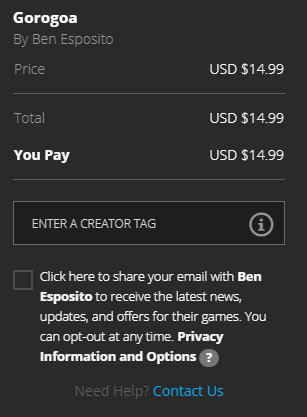
They may have fixed this already, but Ben Esposito is not the developer of Gorogoa; Ben is the developer of Donut County. Who exactly will my email address go to if I click the checkbox? Ben? Jason Roberts (Gorogoa's actual developer)? Or does it go to the publisher, Annapurna interactive? Obviously this is a minor, easily fixable glitch, but it hilights some ambiguity with this particular field. As a customer, I'd be much more comfortable sharing my details with a game's developer than its publisher. Maybe there should be two boxes for published games -- one for the developer, one for the publisher?
Another concern (mostly seen on reddit) is the fact that Chinese megacorporation TenCent owns a 40% stake in Epic. Although this is not a controlling share, some customers are concerned about their personal information being available to a company that is effectively an arm of the Chinese government.
For context, TenCent is a major investor in a large number of tech and gaming firms, including a majority stake in Riot games, developer of League of Legends. They're also a major investor in Discord.
A bigger concern for customers is platform security, particularly in light of a recent high profile breach. For context, Steam has had their own share of hacks, and anyone who's run a Discord server is all too familiar with the ever present threat of hacks, server raids, and compromised mod accounts. I'm not aware of any security breaches on Kongregate/Kartrige, but that doesn't mean there haven't been any.
PC gamers can be a paranoid bunch, but given all the shenanigans giant tech companies foreign and domestic have been up to lately, the onus is on companies to win customers' trust. Epic can work to win this trust by being careful, proactive, sincere, and move swiftly to fix mistakes when they make them.
Summing up, Epic's appeal to customers is two-sided. On the one hand they have opened themselves up to the most criticism from consumer rights advocates. On the other hand Epic has just about the strongest customer draw possible -- free stuff and exclusive content. My estimation is that right now they're the clear front-runner with customers as well as developers, and simultaneously the one catching the most negative attention.
Discord
Discord basically has a slightly weaker version of Epic's offering to customers, with a few key mutations. They've got some timed exclusives, and a much larger library of games, but their big huge offering is their Discord Nitro subscription. This is a tremendous value on the one hand -- 73 games for just ten bucks a month! That's easily $1000 worth of games.
The catch is that you don't actually own the games. The library will periodically rotate, and if your Nitro subscription runs out, you won't be able to install any of those games again. But it seems like any bits already installed on your system will remain there and continue to work.
Also, customers can be leery of subscriptions because it seems like everybody and their mom is trying to push subscriptions these days and there's only room in the budget for so many.
Personally, I prefer to buy games a la carte because I don't have the time to play games by the truckload, I only want to play specific games. That said, $10 / month is only $120 / year, so for the price of two new AAA releases I could pick and choose from the best nitro games.
Discord does well in terms of customer-friendly features; Discord is the first of the three to feature cloud saves in their SDK, they have the most client localizations already up and running, but I don't have good data on international currencies support or what their payment processing looks like.
In terms of community features, Discord is king. It's completely eclipsed all other competing chat services as the go-to place for voice and text chat for games. It's the epicenter of game communities and there's a strong argument for making it your game launcher and storefront -- a one-stop-shop for all things gaming.
And that's exactly where Discord starts to run into trouble. It's not clear that everyone wants Discord to be anything more than a chat service. They have 130 million registered users, but we don't know how many have Nitro subscriptions, have ever bought a game, or even know that Discord has a store.
On the negative side, a lot of the same concerns with Epic apply here -- if you're worried about TenCent they're also a major investor in Discord, and although Discord surfaces metacritic reviews, there's no on-site rating system. There's also no forums, so if you prefer posting to chatting you're out of luck.
The store itself is buried to the point of being actively hidden, and I really worry that the inevitable conflicts between the needs of the chat feature and the needs of the store are going to make a mess of the whole thing. Most troubling, Discord has the least institutional experience of the three main competitors when it comes to selling and supporting games.
Discord has some strong offerings for customers, but the majority of it is hidden behind a subscription paywall and there's very little you can play for free just by downloading the client. They are entirely banking on their chat users converting into game customers, but it's anyone's guess whether that will actually pan out.
Kartridge
Kongregate the web portal built itself off of truckloads of high quality games you can play for free, and Kartridge is taking a page from that book. Of the three platforms, this is the one with the most free stuff to play right now. On top of that, Kartridge is the only one of the three that comes with a rewards system that lets you earn points towards purchases and discounts by buying and playing games. This is descended from the extremely popular badge system from their web portal, and is a lot less convoluted than Steam's trading card system.
That said, they don't have much at all in the way of "Triple-I" indies, AA, or AAA content. A lot of their free games come from their web portal, which isn't everyone's cup of tea. They don't have cloud saves as of this writing, and the beta version of their client only supports English and USD payments.
On the other hand, they do have user ratings and a well laid out store that is easy to search and filter, along with prominent sections that highlight hand-picked curated content, such as Staff picks or the Indie Megabooth spotlight. This is exactly the sort of system many have been calling for, so we'll have to see if it wins customers over.
Kartridge is also positioned somewhat orthogonally to Epic and Discord -- there's plenty of overlap with the Steam's audience for the games they're after, but they are also bringing in their web portal players who don't have the same expectations as your typical Steam customer.
Bottom line, Kartridge does well with features and is fairly appealing on a technical level, but needs to get more content online. Kongregate CEO Emily Greer had this to say about upcoming content:
Exclusive content is also obviously important in terms of driving engagement with a new platform, which we are rolling out this year from our publishing portfolio of premium and free-to-play games. But we’re also signing some really exciting exclusives where we are not the publisher that we’re eager to be able to announce soon.
RobotCache
RobotCache's appeal to customers will likely remain a mystery until it's launched for real, but we know the big draw is the ability to resell games. I know I wouldn't mind liquidating a lot of the games in my Steam backlog that I never play! That said, I really hope RobotCache launches with more than just that. Reselling games might be an appealing feature to add on top of an existing successful service, but it's not enough to draw customers in by itself. Furthermore customers are getting a pretty small share of resold games at only 25% of the resale price.
RobotCache's other feature will be their "Iron" virtual currency which you can "mine" despite the fact that it's no longer a cryptocurrency. I suspect the way this will turn out is similar to what Asus is doing - letting players download a client that will use their idle GPU cycles to contribute to a commodity cryptocurrency mining pool that Asus controls, and compensate them via some reward scheme that Asus dictates.
RobotCache had this to say when I asked about their appeal to customers:
We recently announced the Founders Club, which is free to join. It is a one-time opportunity and once we officially launch (after Early Access concludes), you will not be able to register for Founders Club. Anyone who participates in Early Access is a Founder forever and will receive rewards including an exclusive Founder’s badge, priority to Early Access, and coming soon the ability to reserve your Cacher name and an ongoing mining buff. There will be additional rewards and exclusive opportunities that are only open to Founders. Early Access is the opportunity for our most passionate and trusted members of the community to gain access to the Robot Cache platform and work hand in hand with the Robot Cache team to provide feedback and suggestions toward the public release. We will have more to share in the future.
They had this to say when I asked them about how mining for Iron will work:
First, Cachers should know it’s on an opt-in only basis, if it’s not for you then cool! Second, yes, the crypto markets are influx and we’re paying a lot of attention as they will surely continue to ebb and flow and hopefully eventually rise again. Our goal is to take the mystery out of mining to make it as a simple as a click. With this in mind, pool optimization is critical so we’ve spent time engineering a system that will pick the right coins for the right cards to mine most effectively (beyond the most commonly known). Clearly, it’s important for the cost of mining to be less than what you get out of it! Third, Robot Cache will use a percentage to not only fuel our business but also put back into our ecosystem in terms of rewards. We’re thinking of mining buffs that would give users even more additional value that can be applied towards buying more games! Lastly, we also have dreams of using our mining pool, which could be one of the largest in the world as we scale and grow, towards humanitarian efforts. There are so many interesting possibilities when you aggregate that kind of computing power towards difficult mathematical problems the world is trying to solve. It’s a new territory and therefore we’re being cautious, but our community should know our intent is to make it as economically viable as possible, so everyone wins.
There's some interesting offers here but questions remain. For one, if I'm a player mining crypto, why not just cut out the middleman? Whatever rewards you're giving me must be below market rates (or else how would you profit?), and even if RobotCache makes mining easy for the average consumer that still means slowly burning out my GPU and cranking up my electricity bill in exchange for discounted virtual currency I can't spend anywhere else. Also, RobotCache isn't the only one selling easy-to-use community mining pools.
As far as security goes, there are some serious reasons to be concerned about blockchain. Besides Ethereum exploits and 51% attacks, there's also the specter of blockchain forks and plain ol' fraud from stolen accounts and heists. If the games in my library constitute liquid assets that can be sold for a profit, that gives scammers a big incentive to break in and steal my games, and because the blockchain is immutable, there's a serious risk that RobotCache won't even be able to reverse the fraudulent transactions.
Also, "immutable DRM" may sound positive to certain developers and publishers, but it's wildly unpopular with customers themselves.
I've asked RobotCache some follow-up questions and will update this article if/when I get their response.
Honestly I'm quite skeptical but I sincerely hope RobotCache will prove me wrong when they finally launch.
EDIT: I got a few more responses from RobotCache, and their replies are troubling. I'm done giving them the benefit of the doubt and am now confident this platform will be dead on arrival.
Q. What is your plan to mitigate 51% attacks?
A. (I had to look this up, it refers to an attack on blockchain, usually bitcoins, for which such as attack is still hypothetical – by a group of miners controlling more than 50% of the networks mining hashrate, or computing power.) There are many ways to attack a blockchain, and if a 51% attack occurs (theoretical), then effectively that blockchain is in jeopardy and untrustworthy. However we can (and do) watch Orphan rates, and when they spike, we keep an eye on the integrity of our networks and data. Also during orphan spikes we can offload data before it gets compromised.
I was speaking to a PR representative feeding me replies from RC, so "I had to look this up" part was not from RC themselves.
Q. Why is a blockchain necessary? Why not a simple centralized database to register ownership?
A. We need to PROVE (beyond a shadow of a doubt) that someone is the owner and has the right to a digital asset. This is why we use blockchain. Yes, this can be done conventionally, but it’s susceptible to an attack, and also internal modifications (an internal bad actor could make whatever changes they want, whereas the blockchain can’t be easily manipulated). And we regularly hear from developers that the DRM on our competitors isn’t foolproof.
Q. What happens if the blockchain experiences a hard fork?
A. We are vigilant on keeping up to speed on the status of many blockchains, and Robot Cache is really blockchain agnostic, meaning we can swap to many other chains very easily.
In short, RobotCache feels that conventional DRM is not strict enough, it's very important they use BlockChain because it's immutable and "PROVES" ownership, they glibly dismiss the very real threat of a 51% attack on small market-cap blockchains, but not to worry, if their blockchain experiences a hard fork, they can unilaterally swap to another chain?
Crucially they have not yet answered my most important question:
Q. If my account is stolen through no fault of my own and my games are sold for profit by a scammer, what will RobotCache do to make me whole?
Conclusion
We need to remember that these four are all trying to take a big bite out of Steam, and shouldn't lose sight of the real prize -- gaining significant market share and sales in digital PC games. The really clever sharks will find a way to do this that doesn't require gaining every single new customer at Steam's direct expense.
So far it's Epic's game to lose. They're doing most things right, and the bumps they're encountering along the road probably aren't going to be enough to slow them down unless they make serious mistakes. If you're one of the other competitors, (or if you're Valve), and you are comforting yourself with thoughts like, "Well Epic does/doesn't do X, and we..." then you need to wake up right now and start taking them seriously or they could soon be eating your lunch for breakfast. The gloves are off and they are digging their moat fast and deep as we speak. This doesn't mean you need to panic and make rash decisions or let them drive the agenda, just don't underestimate them. Good job so far, Epic -- but don't let it go to your head.
The company I'm most disappointed with is Discord. They should be giving Epic and Steam a run for their money, but the fact that they failed so hard in telling people they even have a store tells me they're not taking this seriously. Half-measures will not cut it in a red ocean. Go all in or get out, like Twitch did.
Even discounting that issue, it's not clear Discord will be able to translate their whopping huge user base into cash in the bank. I'm starting to wonder if their reluctance to advertise their own store is not down to incompetence but rather fear of backlash, given the service was built on the promise of no advertisements. Furthermore, the core of their business plan is the Nitro subscription, which is a double-edged sword. Subs are great money makers, but they're also high friction barriers, gatekeep your best content, and put developers on edge.
Discord does legitimately have a client with some nice features, a well put together store (once you find it), lots of great titles, and some of the best community features around. A naive ranking would easily put Discord in second place, or even in the runnings for first, but their missteps and latent weaknesses push them down far enough to give Kartridge a slight edge.
Kartridge is off to a respectable start but will need to do absoloutely everything right to keep up. They're being squeezed on both sides and they can't throw muscle around the way Epic and Steam can. They're making pretty good offers to indies and present a lot of good value for customers in the forms of free games and reward programs, but customers care the most about big games, and developers will ultimately go where the customers are. Their client is really nice and has a lot more features than Epic's, and unlike Discord they seem to be taking things seriously. But the bottom line is if they want to keep developers interested they're going to have to drive customers to their platform and announce some attractive titles.
RobotCache faces the steepest challenges. Not only are they launching incredibly late, as far as I know they don't have an existing service or userbase to leverage, and the popping of the crypto bubble last year has cast a pallor over all things blockchain. They will need to bring some incredible surprises to the table if they want to succeed in this fight.
For the record, nobody is paying me over or under the table to stand up for or bash any particular company. This analysis isn't what I want the results to look like, or which company I happen to like best, it's my honest (and biased) assessment of who I think is most likely to win out after everybody jumps headfirst into a blender full of hungry sharks.
Any faulty logic, error, ommissions, or other stupid mistakes are entirely my own.
Ultimately, I want to see each store become the best, most competitive version of themselves they can be, because that's what's best for developers, customers, and the market in general.
Good luck out there, and mind the sharks.